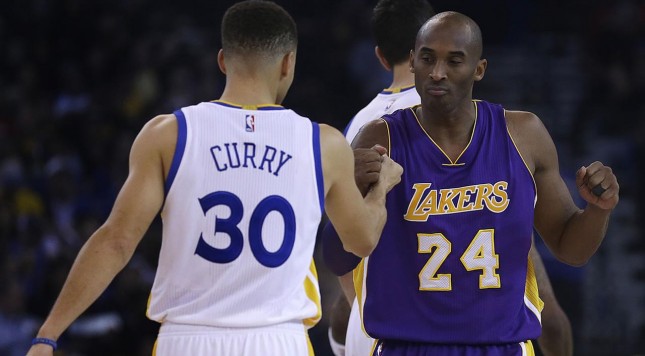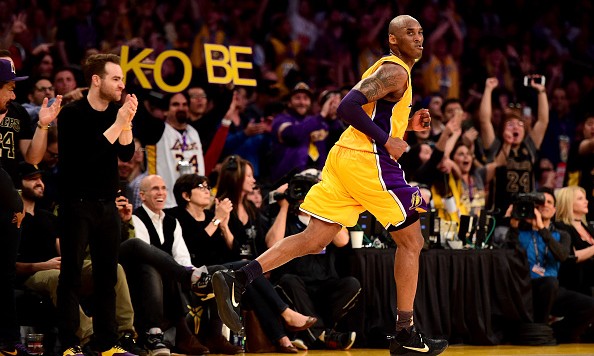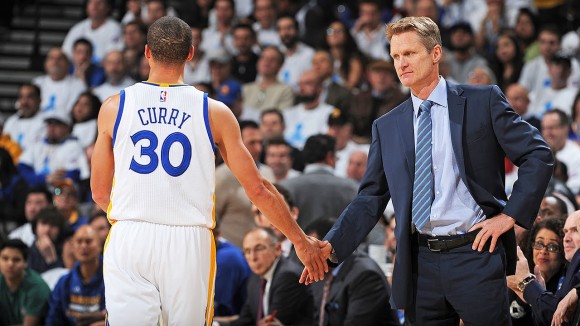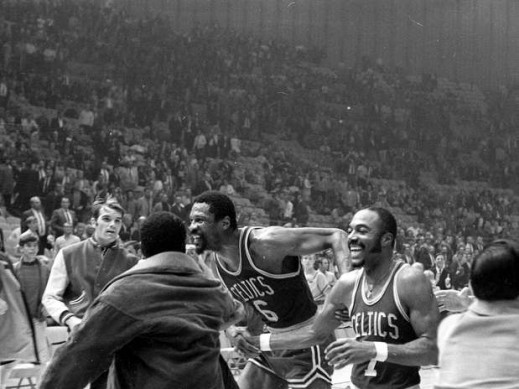Wednesday, April 13, 2016 — it was a “Where were you when?” sports night, and for most American sports fans, Kobe Bryant made it that kind of night.
Is that a fact in the same way that 2 + 2 = 4? No.
Nevertheless, in judging from Twitter and morning-after output by media outlets, Kobe’s 60-point performance in his final NBA game seemed to resonate and carry the news cycle more than the Golden State Warriors’ attainment of 73 regular-season wins, breaking the 1996 Chicago Bulls’ mark of 72.
Kobe’s 60-burger represents a great walk-off. It’s a round number, and a huge one at that. It’s going to stick, and it should.
Kobe is being lavishly congratulated for what he did on Wednesday, and let’s be clear: He SHOULD BE.
If you read it once, you can repeat it to yourself 1,000 more times: Kobe’s finale was genuinely great.
Those of us who traffic in sportswriting sometimes fall into the trap of using the word “great” to describe an athlete or performance, when we’re really just slapping on hyperbole to try to get the attention of readers. It’s important to emphasize that overuse of the word great — applying it to people or situations which don’t merit the term — diminishes its power.
Was Kobe Bryant’s last game great? Yes — it was.
Underline those words in red ink, or do whatever else you need to do to internalize the realization that Kobe’s not being undercut in this next sentence:
As great as his finale in fact was, it is absolute LUNACY to even SUGGEST that Kobe’s finale was better than Peyton Manning’s last game, or that it was better than any other NBA player in history.
Sweet mother of mercy, can we put the brakes to the Hyperbole Express? Such is the challenge when something happens akin to what we saw Wednesday night in Los Angeles.
What’s subtle about the way in which one ought to appraise Kobe’s genuinely — legitimately — great finale is that nothing about the performance itself really needs to be criticized. It CAN be nitpicked on a number of levels, but it doesn’t have to be.
Kobe’s performance doesn’t have to be criticized one bit. One can merely note that it exists in the context of a far larger team achievement, accompanied by a far larger set of individual achievements bundled inside that team-created feat.
The Golden State Warriors became the first team in the NBA’s 70-year history to win 73 games in a regular season. Viewed differently, the Warriors became the first team in league history to finish a regular season with a single-digit number of losses. That is ASTOUNDING.
Equally astounding? As John Cannon noted in his reaction to #GSW73 at The Comeback, Stephen Curry — who entered this season in which no man had ever hit 300 three-pointers — nailed over 400 with his 10-triple explosion Wednesday against the Memphis Grizzlies.
https://twitter.com/CauldronICYMI/status/720463236160757761
Wait — that’s not all.
Cannon pointed out that Steph became the FIRST player in NBA history to average at least 50 percent as a field goal shooter, 40 percent as a 3-point shooter, and 90 percent as a foul shooter while averaging at least 30 points per game. Not one man in 70 years of NBA hoops had done that, until Steph Curry did it Wednesday night. A low scoring output would have held his scoring average below 30, but he lit up Memphis for 46.
Again, one doesn’t need to criticize or diminish Kobe here; one can simply point out that Steph scored 46 points on FEWER THAN HALF AS MANY SHOTS AS KOBE TOOK (24, compared to Kobe’s 50). This efficiency allowed Steph to sit out the fourth quarter, something he did almost 20 times this season. This efficiency is precisely the kind of output which enabled Golden State to win a lot of games easily enough that Steph and other starters received adequate rest over the course of the season. They were fresh enough to win 73 and make a six-game improvement from a 67-15 season in 2015.
Steph added this very important comment after his 73rd win this season:
"The individual stuff comes out of the collective focus of winning." – Steph
— Zach Harper (@talkhoops) April 14, 2016
There’s the real centerpiece of all this.
You don’t have to say a single negative thing about Kobe’s achievement in order to locate that achievement in a much larger context. You can simply focus on the magnitude of what Steph and the Warriors have done to realize what it means to produce a truly great NBA finale as a player.
The best finale — indisputably and unquestionably — for any all-time great athlete is to win a championship in his final game. Stats are great on their own — again, Kobe was legitimately great against Utah — but the point of being a professional athlete is to win at the highest level.
A great stat line, with or without a title, trumps a bad stat line without a title or any meaningful team achievement. However, a bad stat line with a title trumps a great stat line with nothing else to offer.
On the morning of Kobe’s last game, I wrote this piece on the best NBA finales of all time. No, I did not anticipate Kobe would score 60… or 50… or even 40. Maybe 30 was realistic, but I didn’t see this 60-burger coming. Few did.
Nevertheless, the rush to proclaim something “the best” when it doesn’t remotely belong in the conversation — an easy instinct in a “what have you done for me lately?” culture — flowed through Twitter when Kobe was putting the finishing touches on 60.
Does it matter that the NBA was much smaller, far less deeper, and far less covered on television — with far less social and cultural weight attached to its championship series — in 1969, when Bill Russell won his last game as a player by winning the world title in a Game 7 on the road against his foremost team (Los Angeles Lakers) and personal (Wilt Chamberlain) rivals?
As a professional athlete, and as a legend of the game, there is no debate: Bill Russell enjoyed the greatest NBA finale of any player. As said in the linked piece above, Michael Jordan can’t enjoy that distinction because he didn’t allow June 14, 1998 — Game 6 in Salt Lake City — to be his last NBA game.
Again, this is not about diminishing Kobe. All this piece is focusing on is the higher plateau of others’ achievements — Steph’s and the Warriors’ feats on Wednesday, Russell’s nearly 50 years earlier.
One doesn’t have to — and frankly shouldn’t — take away a single OUNCE of glory or joy or admiration from Kobe Bean Bryant, The Mamba, after his unforgettable 60-point work of art against the Jazz.
All one needs to do to make the point that greater NBA finales — and greater sports finales — exist is to recall the point of professional sports: winning championships, of allowing the individual’s success to flow from team success.
If we’re not focused on that simple relationship between the individual athlete and the accomplishments of his team, why are we following the NBA in the first place?




